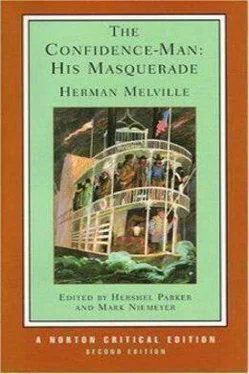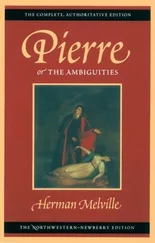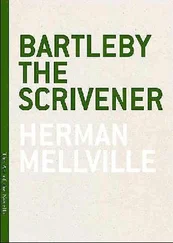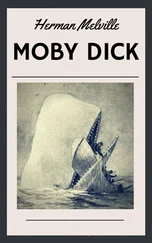"What, sir, to say nothing more, can one be forever dealing in macassar oil, hair dyes, cosmetics, false moustaches, wigs, and toupees, and still believe that men are wholly what they look to be? What think you, sir, are a thoughtful barber's reflections, when, behind a careful curtain, he shaves the thin, dead stubble off a head, and then dismisses it to the world, radiant in curling auburn? To contrast the shamefaced air behind the curtain, the fearful looking forward to being possibly discovered there by a prying acquaintance, with the cheerful assurance and challenging pride with which the same man steps forth again, a gay deception, into the street, while some honest, shock–headed fellow humbly gives him the wall! Ah, sir, they may talk of the courage of truth, but my trade teaches me that truth sometimes is sheepish. Lies, lies, sir, brave lies are the lions!"
"You twist the moral, barber; you sadly twist it. Look, now; take it this way: A modest man thrust out naked into the street, would he not be abashed? Take him in and clothe him; would not his confidence be restored? And in either case, is any reproach involved? Now, what is true of the whole, holds proportionably true of the part. The bald head is a nakedness which the wig is a coat to. To feel uneasy at the possibility of the exposure of one's nakedness at top, and to feel comforted by the consciousness of having it clothed—these feelings, instead of being dishonorable to a bold man, do, in fact, but attest a proper respect for himself and his fellows. And as for the deception, you may as well call the fine roof of a fine chateau a deception, since, like a fine wig, it also is an artificial cover to the head, and equally, in the common eye, decorates the wearer.—I have confuted you, my dear barber; I have confounded you."
"Pardon," said the barber, "but I do not see that you have. His coat and his roof no man pretends to palm off as a part of himself, but the bald man palms off hair, not his, for his own."
"Not his , barber? If he have fairly purchased his hair, the law will protect him in its ownership, even against the claims of the head on which it grew. But it cannot be that you believe what you say, barber; you talk merely for the humor. I could not think so of you as to suppose that you would contentedly deal in the impostures you condemn."
"Ah, sir, I must live."
"And can't you do that without sinning against your conscience, as you believe? Take up some other calling."
"Wouldn't mend the matter much, sir."
"Do you think, then, barber, that, in a certain point, all the trades and callings of men are much on a par? Fatal, indeed," raising his hand, "inexpressibly dreadful, the trade of the barber, if to such conclusions it necessarily leads. Barber," eying him not without emotion, "you appear to me not so much a misbeliever, as a man misled. Now, let me set you on the right track; let me restore you to trust in human nature, and by no other means than the very trade that has brought you to suspect it."
"You mean, sir, you would have me try the experiment of taking down that notification," again pointing to it with his brush; "but, dear me, while I sit chatting here, the water boils over."
With which words, and such a well–pleased, sly, snug, expression, as they say some men have when they think their little stratagem has succeeded, he hurried to the copper vessel, and soon had his cup foaming up with white bubbles, as if it were a mug of new ale.
Meantime, the other would have fain gone on with the discourse; but the cunning barber lathered him with so generous a brush, so piled up the foam on him, that his face looked like the yeasty crest of a billow, and vain to think of talking under it, as for a drowning priest in the sea to exhort his fellow–sinners on a raft. Nothing would do, but he must keep his mouth shut. Doubtless, the interval was not, in a meditative way, unimproved; for, upon the traces of the operation being at last removed, the cosmopolitan rose, and, for added refreshment, washed his face and hands; and having generally readjusted himself, began, at last, addressing the barber in a manner different, singularly so, from his previous one. Hard to say exactly what the manner was, any more than to hint it was a sort of magical; in a benign way, not wholly unlike the manner, fabled or otherwise, of certain creatures in nature, which have the power of persuasive fascination—the power of holding another creature by the button of the eye, as it were, despite the serious disinclination, and, indeed, earnest protest, of the victim. With this manner the conclusion of the matter was not out of keeping; for, in the end, all argument and expostulation proved vain, the barber being irresistibly persuaded to agree to try, for the remainder of the present trip, the experiment of trusting men, as both phrased it. True, to save his credit as a free agent, he was loud in averring that it was only for the novelty of the thing that he so agreed, and he required the other, as before volunteered, to go security to him against any loss that might ensue; but still the fact remained, that he engaged to trust men, a thing he had before said he would not do, at least not unreservedly. Still the more to save his credit, he now insisted upon it, as a last point, that the agreement should be put in black and white, especially the security part. The other made no demur; pen, ink, and paper were provided, and grave as any notary the cosmopolitan sat down, but, ere taking the pen, glanced up at the notification, and said: "First down with that sign, barber—Timon's sign, there; down with it."
This, being in the agreement, was done—though a little reluctantly—with an eye to the future, the sign being carefully put away in a drawer.
"Now, then, for the writing," said the cosmopolitan, squaring himself. "Ah," with a sigh, "I shall make a poor lawyer, I fear. Ain't used, you see, barber, to a business which, ignoring the principle of honor, holds no nail fast till clinched. Strange, barber," taking up the blank paper, "that such flimsy stuff as this should make such strong hawsers; vile hawsers, too. Barber," starting up, "I won't put it in black and white. It were a reflection upon our joint honor. I will take your word, and you shall take mine."
"But your memory may be none of the best, sir. Well for you, on your side, to have it in black and white, just for a memorandum like, you know."
"That, indeed! Yes, and it would help your memory, too, wouldn't it, barber? Yours, on your side, being a little weak, too, I dare say. Ah, barber! how ingenious we human beings are; and how kindly we reciprocate each other's little delicacies, don't we? What better proof, now, that we are kind, considerate fellows, with responsive fellow–feelings—eh, barber? But to business. Let me see. What's your name, barber?"
"William Cream, sir."
Pondering a moment, he began to write; and, after some corrections, leaned back, and read aloud the following:
"AGREEMENT Between FRANK GOODMAN, Philanthropist, and Citizen of the World, and WILLIAM CREAM, Barber of the Mississippi steamer, Fidèle.
"The first hereby agrees to make good to the last any loss that may come from his trusting mankind, in the way of his vocation, for the residue of the present trip; PROVIDED that William Cream keep out of sight, for the given term, his notification of NO TRUST, and by no other mode convey any, the least hint or intimation, tending to discourage men from soliciting trust from him, in the way of his vocation, for the time above specified; but, on the contrary, he do, by all proper and reasonable words, gestures, manners, and looks, evince a perfect confidence in all men, especially strangers; otherwise, this agreement to be void.
"Done, in good faith, this 1st day of April 18—, at a quarter to twelve o'clock, P. M., in the shop of said William Cream, on board the said boat, Fidèle."
Читать дальше












